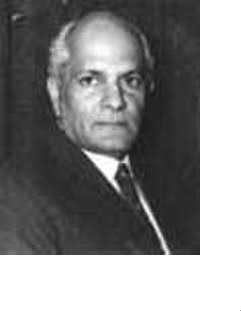
AL Fletcher, ICS Breathed his last this day in 1974
RK Kaushik
The erstwhile Indian Civil Service, or ICS, was known as ‘heaven-born service’ or ‘steel frame’ of the British Raj. Post-Independence, 430 ICS officers opted to serve in the country, prominent among them being Anthony Leocadia Fletcher, also remembered as the ‘Everest of administration’.
Tony, as Anthony was known in his close circles, was born to a Christian family of Kerala on December 9, 1909, his parents being Peter and Helen Fletcher. After completing his school education from St Joseph’s in Trivandrum and his B.Sc and M.Sc from Madras and Nagpur universities, he joined the School of Oriental Studies and then made it to the ICS in 1933.
Accorded Punjab cadre, his initial postings were SDM, Kasur, and ADM, Rawalpindi, and then District and Sessions Judge of Gujarat, Gujranwala, Jhelum and Mianwali. Having served on various administrative and judicial positions, including as Financial Commissioner for five tenures, in post-Partition Punjab, many instances in Fletcher’s life show how brilliant an officer he was and how he tackled vexatious situations and prodigious exigencies.
The British Government used to post an ICS officer as District and Sessions Judge after seven years of service. He got Gujarat district in 1940.
On December 15, 1942, Sir Khizer Hayat Khan Tiwana took over as the Punjab Premier (as the chief minister’s post was called then). Considered quite close to the British, he owned more than 1 lakh acres in Khushab (Sargodha district) and had even sent a 1,200-strong cavalry called ‘Tiwana Lancers’ in World War II.
In 1943, Tiwana visited Gujranwala when Fletcher was the District and Sessions Judge and requested him for a favour in a judicial case. The next day, Punjab Governor Sir BJ Glancy (ICS) too requested Fletcher to be magnanimous. They, however, were flabbergasted as the case’s decision went against Tiwana’s man. The Premier endured the insult, but never interacted with Fletcher again.
Fletcher introduced Sunday sightseeing trips once in two or three months for members of his staff and their families. On one of these visits when employees of the district judge’s office were at emperor Jahangir’s tomb near Lahore, some youngsters poached on a mango orchard and took away some fruits. The poor gardener informed Fletcher that his staff had destroyed the orchard. Fletcher said nothing to his staff, but gave the gardener Rs 400 (a big amount in 1947) as compensation.
After Partition, he served as Commissioner (rehabilitation) as well as of Jalandhar division, besides the five tenures as Financial Commissioner (revenue). Once in 1960, the CM found that Fletcher reached the office at 10 am, and advised him to report at 9 am from then on. Prompt came the reply: “Sir, I am a British ICS officer and the British timings are 10 am to 4 pm. I am habitual of that and old habits die hard.” The Chief Minister smiled and did not respond.
During his term as Financial Commissioner (taxation), a contractor approached him regarding his payment of Rs 5 lakh for a government work. Fletcher tore a piece off a newspaper and wrote on it the payment be released in 60 minutes. His staff placed that newspaper cutting in the file and complied with the orders. He always appreciated and encouraged honest officers. On retirement day of a hardworking tehsildar, he visited his house and informed him that the reward for his honest work was direct recruitment of his son as naib tehsildar — a British practice of encouraging brilliant and honest officers.
Fletcher had been frequently visiting Pakistan after Partition to verify the claims submitted by refugees and it was during this period that he collected information about missing girls/women with the help of his fellow officers (in Pakistan). He had even sought the help of patwaris and SHOs there. The information was compiled with pertinent details of each victim along with her abductor and his address. A rough proof of this extraordinary work was got prepared at the Government Printing Press, Shimla (then Punjab capital). This rare document remained in Fletcher’s personal custody for a few years. When things settled down and Punjab capital was shifted to Chandigarh, he presented that rough proof to Chief Minister Partap Singh Kairon in early 1956 and sought his permission for printing 100 copies for record. But the Chief Minister wrote on the file: “Please do not print it. This book will reopen the wounds of refugees.” The compendium had details of more than 35,000 girls left in Pakistan.
As the late PH Vaishnav, former Punjab Chief Secretary, described Fletcher: “He had the manner of a film star and the bearing of a General. But he was neither an actor nor a soldier. He was a blend of the imperial and the democratic. He was the proud owner of a scarlet Buick, which he drove with the skill and confidence of an ace driver.”
A prominent politician once requested the then CM for appointment of his son as naib tehsildar. The CM wrote a note on which Fletcher recorded his dissent and requested the CM to reconsider his decision. The CM again directed Fletcher to comply with the orders. However, Fletcher recorded his reasons and wrote on the file, “I am convinced this file needs to be punished. Please keep it under lock and key.” And, the file was kept in record without issuance of any orders.
In 1970, Fletcher founded Haryana Agriculture University, Hisar, and was its first Vice-Chancellor. He passed away on December 14, 1974, leaving his admirers and subordinates in tears and a legacy worth cherishing for generations of bureaucrats. He was survived by his widow, a son and two daughters.
(The writer is an IAS officer of the Punjab cadre)



























